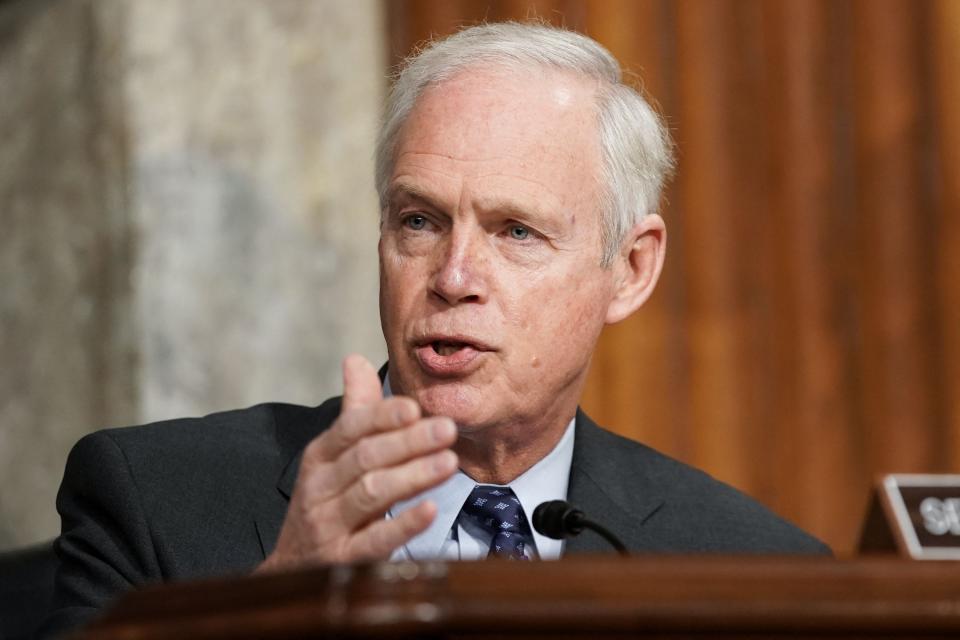Live stimulus updates: Senate no longer expected to begin debate on COVID-19 bill Wednesday
The Senate’s consideration of President Joe Biden’s $1.9 trillion COVID-19 bill has been pushed back a day, according to a senior Democratic aide speaking on condition of anonymity.
The Senate had been set to take a procedural vote Wednesday to begin debate on the legislation, but the Senate was still waiting for the nonpartisan Congressional Budget Office and the Congressional Joint Committee on Taxation to estimate the total cost of the Senate version of the bill, the aide said.
Under the special rules used to pass the bill, the total cost must come in under the $1.9 trillion authorized in previous legislation. The version of the bill passed by the House went billions of dollars over, so Senate Majority Leader Chuck Schumer, D-N.Y., would have to introduce a Senate version of the bill bringing it in line.
Sen. Ron Johnson’s threat to force a reading of the entire bill could delay the process even further. Senators normally forgo the reading out loud of the entire bill, but Johnson said he would lodge an objection and force the nearly 700-page bill to be read out loud, a process he said could take over ten hours.
The Senate is set to stay in session Thursday even as the House canceled its remaining votes and was set to send lawmakers home Wednesday night amid a heightened security threat to the Capitol. The United States Capitol Police said Wednesday they were aware of a “possible plot to breach the Capitol by an identified militia group,” and a notice sent to all congressional offices said the agency was bolstering its security presence.
– Nicholas Wu
Sen. Ron Johnson threatens to hold up COVID bill
Sen. Ron Johnson, R-Wisc., said on a Wisconsin radio station he would threaten to hold up Senate passage of President Joe Biden’s $1.9 trillion COVID bill by forcing Democrats to read the nearly 700-page bill in its entirety.
Senators usually decline to read entire bills out loud when they bring them up for debate, but Johnson said on WISN he would object to the normally routine process and force the bill to be read out loud.
The entire process will “probably take about 10 hours,” Johnson said.
Asked about the effort to read the whole bill, Sen. Ben Cardin, D-Md., said, “I just feel sorry for the reading clerk.”
Johnson said he would “lead the effort to resist” Democrats’ passage of the bill and would also offer more amendments to the bill following debate, potentially prolonging final passage of the bill through the weekend.
The Senate was set to begin debate on the bill today, setting up final passage later in the week, but Johnson’s objections could significantly delay the process.
– Nicholas Wu

$1,400 stimulus checks to be capped at $80,000 of income
Senate Democrats reached a deal with President Joe Biden to limit the eligibility for $1,400 stimulus checks and phase them out for Americans earning over $80,000, a key goal of moderates who did not want the checks to go to wealthier Americans, according to two sources familiar with the deliberations not authorized to speak on the record.
The stimulus checks would phase out entirely at $80,000 of income for individuals, as opposed to about $100,000 in the version of the legislation passed by the House last week. Joint filers would have their checks phase out entirely at $160,000.
The deal also kept a federal boost to unemployment benefits at $400 a week through August, the sources said, rather than September as some progressives like Sen. Ron Wyden, D-Ore., had advocated.
The compromise clears the way for the Senate to push forward on the bill. They could begin debate on the bill as soon as Wednesday, meaning the bill could pass the full Senate by the end of the week. Democrats aim to pass the bill through the Senate and back again through the House by mid-March, when the current federal boost to unemployment benefits expires.
– Nicholas Wu
Senate braces for marathon debate on stimulus package
President Joe Biden's months-long crusade to pass a $1.9 trillion COVID-19 stimulus plan may enter its final stretch Wednesday, when senators could begin 20 hours of debate on the measure that is expected to come to a vote later in the week.
Meanwhile in the House, leaders are already looking to take up the bill for a final vote as soon as Monday, a timeline that means the law – with its $1,400 stimulus checks, funding to state and local governments and tax credits for families – could become law by next week.
Senate Majority Leader Chuck Schumer, D-N.Y., said Tuesday Democrats are "on track" to pass the bill by March 14, when a federal boost to unemployment benefits expires.
"I expect a hearty debate. I expect some late nights on the floor," he said.
Schumer said the Senate could take a procedural vote as soon as Wednesday to begin debate and set up the process to pass the bill through the chamber later in the week.
Under the Senate process being used to pass the bill, debate on the bill is capped at 20 hours, but it will be followed by a period where senators can introduce amendments to the legislation but cannot debate them. The subsequent flurry of votes is known as a "vote-a-rama."

Republicans cannot do much to stop the final passage of the bill, but the amendment process allows them to force Democrats to take potentially painful votes on controversial issues.
Sen. John Cornyn, R-Texas, predicted the amendment process would be about "walking this plank that Biden and Schumer and Pelosi are asking Democrats to walk."
A key Senate official already ruled a major portion of the legislation, a hike in the federal minimum wage to $15 an hour, cannot stay in the legislation. Democratic senators backed off a plan to levy taxes on large corporations that did not pay their workers at least $15 an hour, citing the limited amount of time to pass the legislation.
Senators are currently deliberating whether to extend the unemployment benefits in the bill from the end of August to the end of September. Sen. Ron Wyden, D-Ore., told reporters Tuesday there was "growing support" to do so. But increasing the overall cost of the bill by adding in provisions like an extra month of unemployment means the Senate will have to make adjustments elsewhere.
Democrats are also considering lowering the eligibility threshold on the plan's $1,400 stimulus check payments. They currently start to phase out after $75,000 of income, but moderates like Sen. Joe Manchin, D-W.V., had previously called for a lower threshold of $50,000 to prevent wealthier Americans from receiving checks.
The bill, which passed the House on a mostly party-line vote last week, must return to the House to be passed one last time before Biden can sign it because of the changes the Senate expects to make to the bill. There are unlikely to be many other substantive changes in the bill by the time it returns to the House.
House Majority Leader Steny Hoyer, D-Md., said the House would likely vote on the bill on Monday. He did not think the Senate would adopt any changes "so egregious" the bill would fail when it came back to the House.
More: Donald Trump, Melania Trump secretly received COVID-19 vaccine in January
2 infrastructure projects derided by Republicans dropped from COVID bill
Two infrastructure projects derided by Senate Republicans were dropped from the $1.9 trillion COVID-19 relief bill Tuesday following deliberations with a key Senate official, according to a spokesperson for House Speaker Nancy Pelosi.
Pelosi spokesperson Drew Hammill said the bill’s funding for an expansion of the BART, a subway system serving the San Francisco Bay Area, was struck from the bill because it was “part of a pilot project.” And $1.5 million in funding for a bridge between part of upstate New York and Canada was also scrapped.
“Now that the two projects that Republicans misled the public about in the House bill have been removed, it is unclear how Republicans will justify their opposition to the American Rescue Plan, which has strong bipartisan support among the public,” Hammill said.
The projects had drawn fierce opposition from Republicans, who derided them as unrelated pet projects for Democratic leaders.
Sen. John Barrasso, R-Wyo., said Tuesday, "This is the way Nancy Pelosi gets $140 million for her tunnel of love to Silicon Valley."
The bridge, however, was in the district of Rep. Elise Stefanik, R-N.Y., a top Trump backer, and had originally been part of a funding request under President Donald Trump’s administration by then-Transportation Secretary Elaine Chao.
The bridge had been dropped during deliberations because the congresswoman representing its district, Stefanik, did not advocate for it, according to a Senate source.
Stefanik spokesperson Karoline Leavitt said the bridge funding had been a “bad, bad deal” relative to the amounts of funding for other projects in the bill, calling the spat a “swing and a miss” for Pelosi.
– Nicholas Wu
This article originally appeared on USA TODAY: Biden stimulus bill: Ron Johnson threatens to hold up Senate passage

